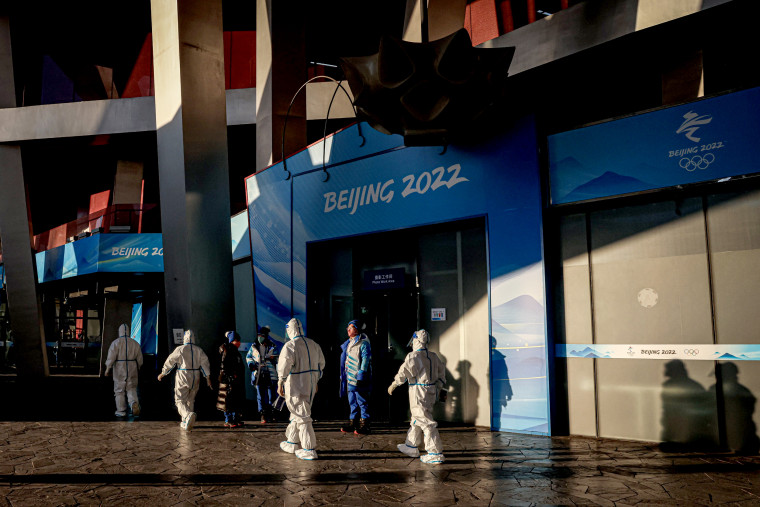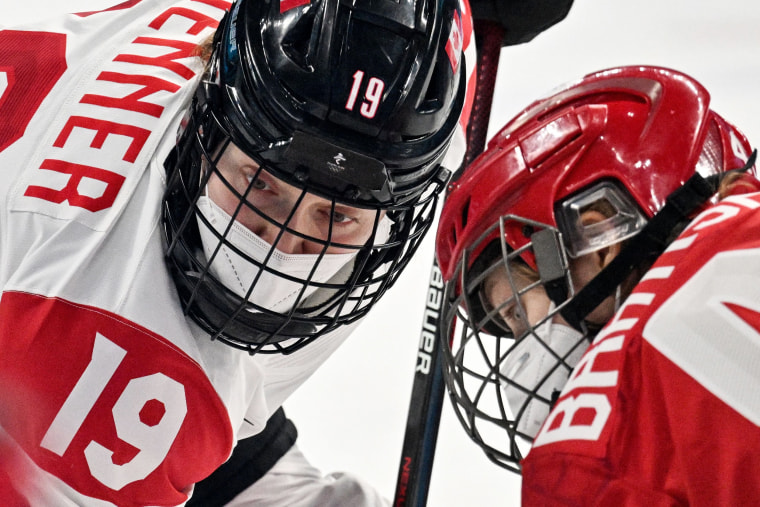The Olympics are always an anxious time for competing athletes.
But strict coronavirus restrictions, testing confusion and concerns about quarantine conditions in Beijing have added a new layer of stress to the early stages of the 2022 Winter Games.
Amid increasing complaints, organizers stressed that support for athletes was a priority and said they were communicating with athletes and their teams about conditions in isolation facilities.

While the coronavirus was first identified in Wuhan, China, the country's official death rate during the pandemic has been far lower than most other countries' — something many attribute to its strict "zero-Covid" strategy.
So perhaps it shouldn't be a surprise that pandemic prevention measures during the Games have caused a mixture of sporting chaos and emotional distress from hotel rooms to the ice.
Competitors are living and competing inside an Olympic bubble, or "closed loop," and have to take Covid tests daily. If they test positive, they are taken either to an isolation facility or a hospital, depending on the severity of their symptoms, until they are discharged either through negative tests or the sign-off of a panel of medical experts.
U.S. figure skater and medal hopeful Vincent Zhou was among the latest athletes to test positive for Covid, and he was forced to withdraw from the individual event starting Tuesday.
"I have been doing everything in my power to stay free of Covid," he said in a tearful video posted on Instagram on Monday. "I've isolated myself so much that the loneliness I've felt in the last month or two has been crushing at times."
Also on Monday, a women's hockey game between Canada and the Russian Olympic Committee was first delayed and then played with masks on because the results of the Russians' Covid tests were not available by game time, according to The Associated Press.
After tests results eventually arrived revealing no positive results, the Russians took off their masks for the start of the third period. The Canadians finished with their masks on and romped to a 6-1 win.

Perhaps most dramatically, Australia’s mixed doubles curling team found out they could not compete in the Olympics and were set to fly home after one of the pair, Tahli Gill, was told she had tested positive, only later to be told that, in fact, they were back in.
The AP reported that the duo had to rush to the Ice Cube in a cab to make their game against Switzerland on Sunday, which they won.
Other athletes, however, have been less lucky and found themselves ticking down the days in isolation facilities, missing events and in some cases becoming distressed by their conditions.
Polish speedskater Natalia Maliszewska spoke Sunday of her exhaustion after organizers flip-flopped on whether she would be able to compete.
“I’ve been living in fear for over a week,” she said in a tweet. “These mood swings, the crying that makes me breathless.”
Maliszewska later told Reuters in an interview that she cried "like crazy" in the back of an ambulance after a 3 a.m. knock on the door of her isolation hotel room because she did not know what was happening.
Maliszewska was finally cleared to compete, according to Reuters, but she was not the only one exasperated by her experience.
Meanwhile, the coach of the Finland men’s ice hockey team on Sunday accused China of not respecting the human rights of Finnish player Marko Anttila, saying he was “not getting good food” and was under tremendous mental stress, according to Reuters.
The list goes on. More than 150 athletes and team officials have tested positive since Jan. 23.
Asked about the Finnish case, Beijing's foreign ministry spokesperson, Zhao Lijian, said "China is committed to hosting a streamlined, safe and splendid Winter Olympics."
The Beijing Organizing Committee has put in place Covid-19 protocols to safeguard the health of all those involved that have been "highly recognized," including by the World Health Organization, he added.
Brian McCloskey, chair of the Beijing 2022 Medical Expert Panel, assured reporters Tuesday that isolation decisions were based on science.
“The medical expert panel has been meeting regularly,” he said. “We’ve been looking at the evidence as it emerges from around the world and applying that to the protocols we have developed here.”
In an apparent effort to allay concerns, the International Olympic Committee said Monday it held a call with athletes to discuss conditions at isolation hotels.
Kit McConnell, sports director for the IOC, said the key points that were raised included issues with the internet, meals — where there have been "significant improvements" — access to sports equipment and mental health.
"The athletes in isolation remain an absolute focus," he said at a news conference Monday. "There is a collective responsibility to support these athletes."